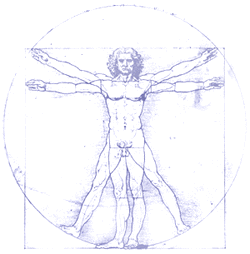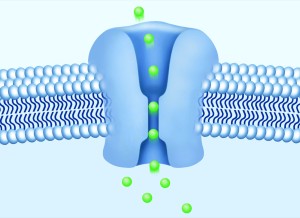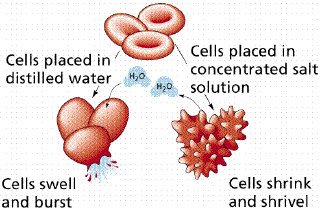
Home | Teaching | Research | Publications | Curriculum Vitae | Personal Interests
Teaching Interests
|
(www.csusm.edu/ shs/involvement.htm) |
"All the vital mechanisms, however varied they may be, have only one object, that of preserving constant the conditions of life in the inner environment." Claude Bernard (1813-1878).
"Homeostasis is the state of equilibrium of the internal environment of the body that is maintained by the dynamic process of feedback regulation." Walter Cannon (1871-1945).
(cenocracy.topcities.com/ cro54.html) |
(bio.winona.msus.edu/.../ images/osmosis.gif) |
Current Course Responsibilities
Biology 103: Human Biology
This course examines the structure and function of many of the major organ systems of the human body. In so doing, it introduces students to a range of important topics related to human beings. These include the nature of science as a discipline, and the biological basis of health, disease, nutrition, exercise, sensation, and reproduction.
Biology 120: Organismal Biology
This course addresses the organization and function of organisms. Although focused primarily on plants and animals, other kinds of organisms will be discussed. Regulation, homeostasis, and integration of function; nutrient acquisition, processing, and assimilation; photosynthesis; gas exchange; reproductive patterns; and development are topics that will be included. Readings from an introductory text and the secondary and primary literature will be required. Corequisite: Chemistry 110.
Biology 136: Biology Core Sminar: Sensing the Environment
Virtually everything an animal does depends on receiving and correctly interpreting information from its external and internal environments. This course examines the nature of different stimuli and the general properties of sensory reception. Specific biological examples will be chosen by students, and could include topics such as photoreception, chemoreception, mechanoreception, electroreception, thermoreception, magnetoreception, and nociception. Prerequisite: Biology 120 and Chemistry 110.
Biology 340: Animal Physiology
This course focuses on mechanisms of homeostasis in vertebrates and invertebrates. A particular emphasis will be placed on examining specific adaptations (functional, morphological, and behavioral) to different environmental conditions, as well as problems associated with physical size. Topics will include integration and response to stimuli, gas exchange, circulation, movement, buoyancy, metabolism, thermal regulation, osmoregulation, and excretion. Prerequisite: Biology 120, 221, and Chemistry 111.
Biology 492: Independent Research Colloquium
This course fulfills a portion of the Senior Studies Requirement for students engaged in senior thesis research. The focus of the course will be the development of a senior thesis and public seminar. Prerequisite: Biology senior thesis in progress or permission from the instructor
Home | Teaching | Research | Publications | Curriculum Vitae | Personal Interests


